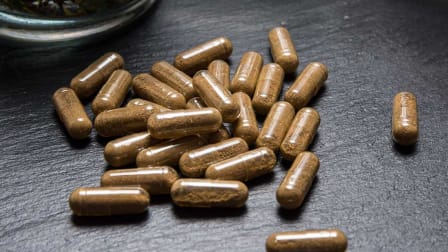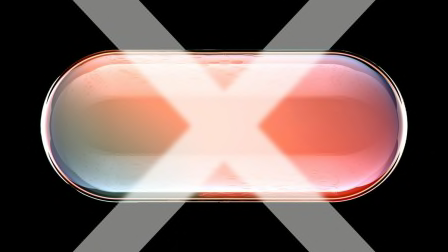These Supplements Are Popular. Do They Actually Work?
What improves sleep, strengthens immunity, boosts memory—and what doesn’t

When her daily migraine medication wasn’t cutting it, Aubree Wolber’s doctor suggested a magnesium supplement. The 28-year-old from Ypsilanti, Mich., was skeptical: “I wasn’t convinced it was going to work for headaches I had been having for 15 years.”
After a few months, her headaches did improve—but she’s still not sure whether it’s because of the magnesium or other changes she made, such as drinking more water.
Wolber is one of the millions of people who regularly take vitamins, minerals, and other supplements. Sixty percent of us, in fact, take them daily, according to a summer 2022 nationally representative Consumer Reports survey (PDF) of 3,070 U.S. adults.
But do all those pills actually make us feel better?
Like Wolber, many people turn to supplements when they are facing hard-to-treat issues. And sometimes they seem to help. But it’s difficult to know for sure whether a given supplement is working, especially when other lifestyle or medication changes may be underway at the same time. What’s more, our health can also improve (or worsen) without an obvious trigger.
To better understand how Americans use supplements, CR’s survey asked respondents which ones they take and why. We found that a few—antioxidants, probiotics, fish oil—are popular for many reasons, while others tend to be used in more specific cases. (Vitamins, including multis, are used for almost everything, so they’re covered separately in “The Truth About Taking Multivitamins”) Here’s what our survey found to be the most popular supplements taken for each reason, plus what works, what might not, and the fixes you can try instead.
Bolstering Overall Health
Fish Oil
Why it’s used: Fish oil—derived from oily fish such as tuna and herring—contains omega-3 fatty acids, which are anti-inflammatory. People take the supplements to guard against chronic inflammation, which is linked to a greater risk of cancer, heart disease, diabetes, and some other health problems.
The evidence: Research has found that fish oil can indeed tamp down inflammation and may ease the symptoms of rheumatoid arthritis. Some healthcare providers even prescribe high doses of prescription-grade fish oil to help patients manage cholesterol levels, says Sara Bonnes, MD, an internal medicine physician and nutrition specialist at the Mayo Clinic in Rochester, Minn. People with a history of heart disease may get a small benefit, but fish oil supplements have not been shown to reduce the risk of developing heart disease in those who don’t yet have it.
Strengthening Immunity
Zinc
Why it’s used: This mineral can help the immune system fight off pathogens, and getting too little is linked to an increased risk of infectious disease.
The evidence: In people who are zinc-deficient, supplementing may help prevent illness. In a small 2008 study, older adults who took 10 mg of zinc daily had improved immune responses after seven weeks. But people who are generally healthy and eat a balanced diet probably do not need to bother, says Lothar Rink, PhD, a zinc researcher and director of the Institute of Immunology at RWTH Aachen University in Germany. What’s more, high zinc intake can cause nausea and stomach upset, and taking too much can suppress the immune system, Rink says.
Antioxidants
Why they’re used: Antioxidants protect cells against damage from free radicals, which increase inflammation and are believed to contribute to the development of disease. Antioxidant supplements are often a blend of vitamins, minerals, and herbal or botanical extracts.
The evidence: Research suggests that an antioxidant-rich diet can help promote a healthy immune response. But taking antioxidant supplements does not offer significant protection against disease, according to a National Institutes of Health analysis of studies involving thousands of people. In some cases, high doses can actually increase the risk of adverse health outcomes.
Probiotics
Why they’re used: Probiotics were popular in CR’s survey not only for promoting overall health but also for strengthening immunity. In theory, introducing more good bacteria to your gut could help your body fight off infection and prevent diseases.
The evidence: A 2018 review of the research suggests that probiotic supplements can temporarily increase good bacteria in the gut and improve immune system function. But scientists don’t yet know whether the supplements create any long-term gut changes that would support the immune system.
What Else to Try
Many of the habits that improve overall health also benefit the immune system. These include eating lots of fruits and vegetables, getting plenty of exercise, and managing your stress. But it’s especially important to get enough sleep. Sleep is critical to proper immune function, and ongoing sleep loss is linked to immunodeficiency. “So many factors influence immunity, and a pill probably won’t be the one thing that fixes everything,” Bonnes says.
Getting Better Sleep
Melatonin
Why it’s used: Your body runs on an internal clock called the circadian rhythm. Melatonin, a naturally occurring hormone, helps signal to your brain that it’s bedtime. A melatonin supplement might make it easier to fall asleep.
The evidence: Taking melatonin can help people fall asleep about 7 minutes faster, on average, and studies show that it’s useful for people with jet lag or a sleep disorder called delayed sleep phase syndrome. But to avoid interfering with your body’s natural production, high doses should not be taken long-term, says Selena Chan, DO, a psychiatrist and interim director of clinical programs at the University of California San Francisco Osher Center for Integrative Health.
CBD
Why it’s used: Some people use this compound, a nonpsychoactive derivative of hemp or marijuana, to relieve anxiety and promote sleep.
The evidence: A 2017 paper suggests that CBD may be a reasonable treatment for insomnia, but the scientists say that such research is in its infancy and that more long-term studies are needed. As long as you’re practicing good sleep habits and not taking other medications at the same time, Chan says CBD may be beneficial before bedtime—just check with your doctor first.
Magnesium
Why it’s used: The mineral magnesium may help reduce stress and relax the body before bed. Magnesium supplements can be taken as pills or as a powder added to drinks.
The evidence: Research in this area is scarce. While some studies link magnesium with better sleep quality, it’s unclear whether supplementing helps with sleep disorders such as insomnia and restless leg syndrome. (Be sure to avoid types called magnesium oxide or citrate for sleep use because these forms are more commonly used as laxatives.)
What Else to Try
A consistent sleep routine can help signal bedtime to your body. Relax without screens, whether you journal, read, or take a bath, Chan says. Try to limit alcohol, and don’t consume caffeine after lunchtime. For sleep disorders, medication or a form of psychotherapy called cognitive behavioral therapy for insomnia (CBT-I) can also be effective.
Improving Memory
Nootropics
Why they’re used: Nootropics is an umbrella term for substances that can affect your neurological state, says Chan at the Osher Center for Integrative Health. They include familiar things such as caffeine, herbs such as Ginkgo biloba, and amino acids such as L-theanine. Nootropics are often marketed as a quick fix to improve cognitive function.
The evidence: Years of evidence have shown that in low doses, natural caffeine can sometimes improve mental performance. But other nootropics are generally not well-studied, and some may contain unsafe, unapproved drugs.
Fish Oil
Why it’s used: The idea here is that because fish oil can make cell membranes more fluid, it might reduce inflammation in the brain and improve your cognitive processes.
The evidence: While some research links higher omega-3 levels with better brain health, one study found that taking fish oil supplements did not lead to improved cognition.
Antioxidants
Why they’re used: Oxidative stress from free radicals may harm the brain, speeding memory loss. Antioxidants can protect against oxidative stress and its effects, which could protect brain function.
The evidence: An antioxidant-rich diet—with plenty of produce like berries, squash, carrots, and cruciferous vegetables—may promote brain health. And one 1997 study in older adults found a link between higher levels of certain antioxidants and better performance on memory tests. But antioxidant-rich foods contain lots of other helpful nutrients, too, and Bonnes at the Mayo Clinic says more research is needed to see whether supplements on their own can improve memory or cognition.
What Else to Try
Make sure your diet is rich in anti-inflammatory foods, such as fruits, vegetables, and fatty fish, all of which promote brain health and function over time. The Mediterranean diet, for example, is a go-to, says Chan at the Osher Center. Stress-reduction techniques, such as meditation, can also help promote better cognition. And staying engaged and learning new things as you age can keep memory sharp, too.
Nourishing Skin, Nails, or Hair
Biotin
Why it’s used: Biotin, or vitamin B7, helps the body grow healthy hair and nails.
The evidence: In people with health conditions that cause a vitamin B deficiency or result in hair loss or brittle nails, limited research suggests that biotin supplements may help. But there is even less evidence that biotin helps people without such issues. Biotin can also interfere with certain common lab tests, which could cause misdiagnoses.
Collagen
Why it’s used: Collagen gives skin its structure. Over time, aging and sun damage can break collagen down, causing dark spots, blemishes, and wrinkling. People take collagen, usually derived from the connective tissue of cows and some other animals, to promote skin health.
The evidence: Research is preliminary, but a 2019 review suggests that collagen supplements may improve skin hydration, elasticity, and wrinkling. Look for hydrolyzed collagen, which your body can use more easily, says Brian Abittan, MD, director of skin and hair rejuvenation and hair transplantation at Mount Sinai Health System in New York City.
Fish Oil
Why it’s used: People take fish oil not only for their general health and cognition but also because the fatty acids in fish oil can help cells hold water. Hydrated skin cells could theoretically result in more supple, healthier-looking skin.
The evidence: While this makes sense in theory and may even work in practice, so far there isn’t sufficient evidence showing that taking fish oil pills helps hydrate the skin or improve its appearance, Abittan says.
What Else to Try
Anemia, thyroid problems, and other medical issues can affect hair, skin, and nails. So if you notice changes in any of those, check with a healthcare provider. Once you rule those out, there are good treatments for hair loss, such as oral and topical minoxidil. Skin and hair health involves simple steps, not a special serum: Eat a healthy diet, reduce stress, drink water, use moisturizer, avoid too much sun exposure, and apply daily sunscreen with SPF (sun protection factor) 30 or higher.
Boosting Mood
CBD
Why it’s used: CBD is popular as a mood enhancer for the same reason it’s used for sleep. Taken in pill or liquid form, it is thought to soothe anxiety, perhaps by increasing serotonin, a chemical that helps regulate mood.
The evidence: A 2019 analysis of 27 studies concluded that CBD may ease symptoms of certain mental illnesses, including anxiety, but more evidence is needed. So proceed with caution: CBD can slow the metabolism of other substances, says Chan at the Osher Center, and taking it with caffeine, for example, may leave you feeling more anxious.
Melatonin
Why it’s used: Melatonin is typically used for sleep, but the chemical might also play a role in mood. People with depression and bipolar disorder often have lower melatonin levels, so some people use the supplements to try to improve mental health.
The evidence: If your mood is suffering because you’re not sleeping well, melatonin could help, in theory, Chan says, though there’s little hard evidence. One large analysis did find that people who took melatonin before surgery had lower levels of anxiety. But experts recommend talking to your medical team before trying something like this.
Magnesium
Why it’s used: Magnesium—found in leafy greens, legumes, and whole grains—plays a critical role in many bodily functions, including mood regulation. So it’s sometimes taken in an effort to improve mood and ease depression.
The evidence: People who were given magnesium chloride supplements in a 2017 trial showed improvements in depression and anxiety within two weeks. But the study did not include a group given “dummy pills,” so it’s unclear whether the results were due to a physiological change or a placebo effect. Ask your provider about whether magnesium is worth trying.
What Else to Try
If you are experiencing depression or anxiety, talk to a provider right away. Prioritizing sleep, exercise, and a healthy diet can improve symptoms of both. But that’s not always enough, and prescription meds and therapy can help. Either way, experts suggest consulting with a doctor to rule out other conditions that can cause such symptoms or getting a referral to a mental health professional.
Increasing Physical Strength or Stamina
Protein Powders
Why they’re used: Consuming enough protein can help build new muscle and aid in muscle recovery.
The evidence: Research does show that people who do a lot of strength training and don’t get enough protein in their diet may benefit from supplements, at least in the short term. But most other people do not need them, and testing by CR in 2010, and more recently by the nonprofit Clean Label Project, has found concerning levels of lead and other contaminants in certain protein powders.
Iron
Why it’s used: Adequate iron intake can promote healthy levels of hemoglobin in your blood, which your body needs to carry oxygen throughout your body and could make exercise easier.
The evidence: People with anemia sometimes need additional iron, Saper says. Supplements may also raise hemoglobin levels, at least in women, though they can also cause gastrointestinal discomfort, research suggests. And high doses can harm the liver. So in general, skip the pills unless you have received an iron-deficiency diagnosis.
Antioxidants
Why they’re used: Athletes may take them after their workouts in an effort to ease soreness and enhance recovery.
The evidence: Don’t bank on this benefit. A large 2017 review of the research did not find evidence that high-dose antioxidant supplementation significantly relieves muscle soreness. More worrisome: Some previous research suggests that antioxidants may actually hinder recovery.
What Else to Try
Exercise itself, especially strength training, is one of the best ways to improve strength and stamina. And a diet rich in nutrient-dense foods that are high in protein can aid in muscle building and recovery.
Losing Weight
Protein Powders
Why they’re used: Protein can curb hunger, so some people use protein powder to aid weight loss.
The evidence: At least one study suggests that high-protein diets can be more effective than other diets for maintaining weight loss. But as Finnish researchers wrote in a 2019 study, “there is a lack of knowledge about the long-term effects of high protein intake,” and data on the efficacy of protein powder for weight loss are scant.
Fiber
Why it’s used: Fiber—found in fruits, vegetables, legumes, and whole grains—can help you feel full, which could reduce calorie intake.
The evidence: Overweight or obese people who consume fiber supplements lose more weight than those who don’t, research suggests. As a bonus, fiber may also help manage cholesterol. But eating high-fiber whole foods is better than taking supplements, Saper says, because such foods often contain other nutrients that benefit overall health.
Green Tea
Why it’s used: Green tea extract, which contains compounds that some believe may increase metabolism, is marketed for weight loss.
The evidence: Swapping out soda for green tea makes sense, says Bonnes at the Mayo Clinic. But there’s little evidence that the extract helps with weight loss. And it can cause serious liver injuries.
What Else to Try
Losing weight and keeping it off is hard, involving biological, psychological, and social factors. Saper suggests a plant-based diet with lean protein, healthy fats, and plenty of nutritious foods, such as legumes. Also aim to exercise for 30 minutes most days.
Editor’s Note: This article also appeared in the January 2023 issue of Consumer Reports magazine.




















